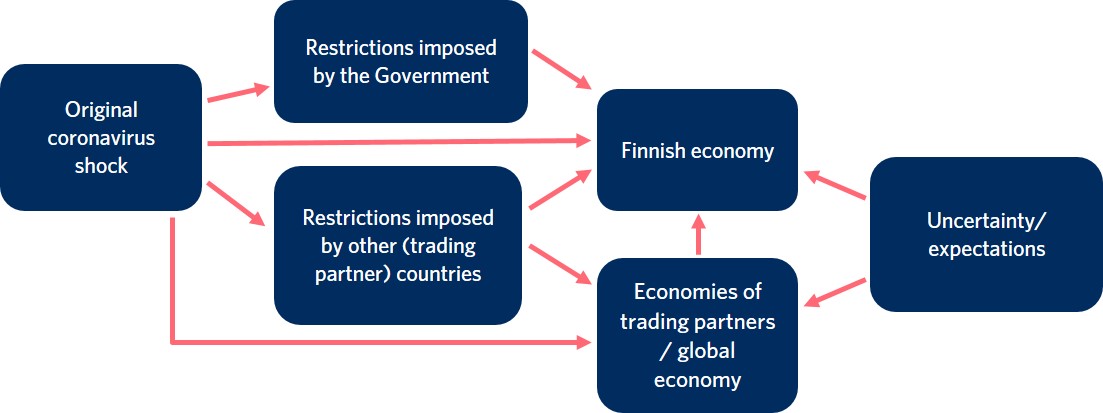The coronavirus pandemic is causing a simultaneous demand and supply shock in the global economy. The biggest costs arise from measures taken to stop the pandemic. The economic crisis will have at least two stages. In the first stage, the restrictions imposed by Finland and its trading partner countries stagnate the home and export markets, preventing conventional expansive fiscal policy. The second stage will begin when the restrictions are lifted, and supply and demand start to recover. The National Audit Office of Finland (NAOF) starts a series of blog posts to address the economic impacts of the coronavirus pandemic.
Although restrictions are necessary for protecting the population and the health care system, they intensify the shock to the Finnish economy in the short term. In addition to the original shock, the restrictions imposed by both Finland and its trading partner countries[1] will radically reduce business activities. Being a small open economy that exports investment commodities to the global market, Finland has a particularly vulnerable position under the present circumstances. The figure below illustrates the direct and indirect impacts of the coronavirus shock on the Finnish economy.

The quarantines and shutdown of schools and service industries implemented as a result of the coronavirus outbreak decrease job opportunities and lead to production stoppages. At the same time, the pandemic is causing a strong demand shock. It reduces the demand for services, particularly tourism and the use of restaurant and wellbeing services. The weakening of prospects in these industries will also spread to other industries. This causes uncertainty to both businesses and households, which is reflected, for example, in the consumer goods and housing markets. International trade is particularly badly affected by the measures taken.
The coronavirus, which has so far been unknown, and the restrictions imposed by public authorities also cause uncertainty, which will further weaken the operating environment of companies. In the current situation, it is difficult to make long-term plans, as they would require predictability of the future. Because of the uncertainty, the psychological impacts of the crisis will take a stronger hold of the economic operators.
In times of economic uncertainty, the reactions of households, businesses, and financial markets may be based rather on emotions than on economic fundamentals. Economist John M. Keynes described this Animal Spirits phenomenon as early as in 1936. Before the financial crisis broke, in the euphoria of the economic boom, financial markets lent money to all euro area countries at the same rate, regardless of their current account deficit or general government finances. Renowned economists George A. Akerlof and Robert J. Shiller have said that it is governments’ duty to influence this kind of behaviour through fiscal policy, if necessary.
Finland has also entered recession
It is obvious that a standstill in production and severe contraction in demand will plunge economy into recession. Like the entire global economy, Finland has also entered recession. The Research Institute of the Finnish Economy (ETLA) has assessed (16 March 2020) that, as a result of the coronavirus pandemic, Finnish GDP will contract this year by 1–5 per cent. In order for the positive end of the scale to be realized, Europe should get the pandemic in control during March–April. In this positive scenario, the EU countries would also strongly promote economic recovery in a coordinated manner.
However, it is likely that the restrictions will remain in force in Finland and Europe longer than currently estimated, and it cannot be ruled out that the virus might return to China. According to the forecast of the Bank of Finland (18 March 2020) as well, GDP will contract this year by 1.5–4 per cent because of a decline in the demand for exports and in household consumption.
Although the restrictions intensify the economic shock in the short term, they are highly likely to prove positive in the long term – even from the economic perspective. Timely reaction may enable less radical measures that permit people’s mobility and (tele)working.
The restrictions will extend but primarily also mitigate the direct impacts of the coronavirus on public health and national economy in the long term. The measures may also increase confidence in public authorities and the functioning of society, which would provide a good foundation for economic recovery.
By way of summary, it can therefore be stated that the development of the national economy depends on different factors in different stages of the crisis, which should be taken into account economic policymaking. The real economy may be facing a plunge similar to the recession in the 1990s. If the fiscal policy fails to increase households’ and businesses’ trust in recovery, the crisis may have disastrous consequences, which will be seen even after decades. Fortunately, general government finances are now much better placed to react to the plight of households and companies than during the recession of the 1990s.
[1] Including the restrictions imposed by the trading partner countries of Finland’s trading partner countries.




